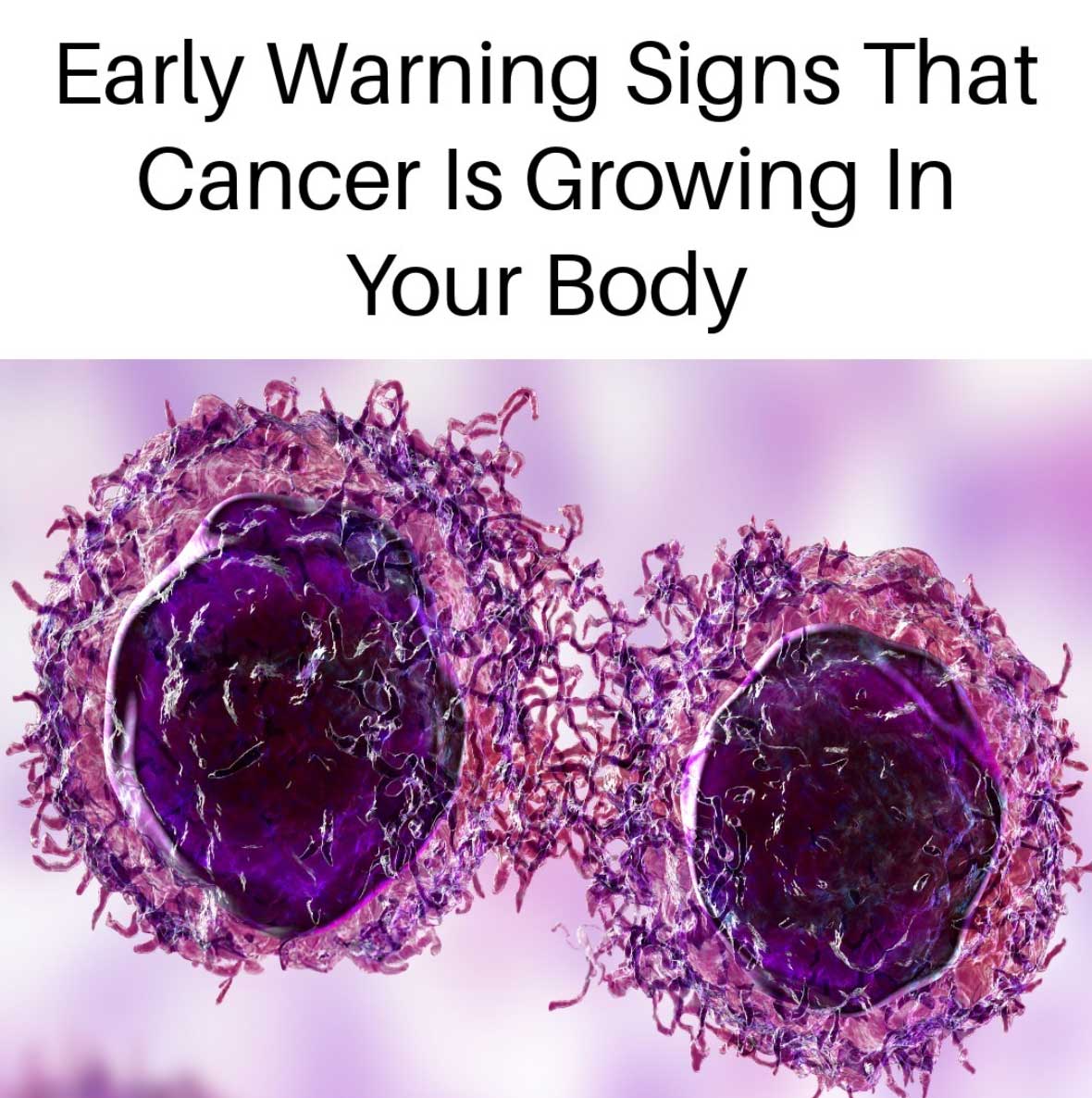You should know this

Cancer is a complex disease that often develops silently. Many types do not cause pain or obvious symptoms in their early stages. However, your body may start to show early warning signs when something is wrong. Recognizing these signs early could be the key to detecting cancer before it spreads, increasing the chances of successful treatment.
⚠️ 1. Unexplained Weight Loss
- What it is: Losing weight without dieting or increasing exercise.
- Why it happens: Cancer cells use up the body’s energy supply or affect how the body absorbs nutrients.
- When to worry: Losing more than 10 pounds in a short time with no clear reason.
- Linked cancers: Pancreatic, stomach, esophageal, lung, and liver cancer.
⚠️ 2. Constant Fatigue or Weakness
- What it is: Feeling drained all the time, even after sleeping or resting.
- Why it happens: Some cancers release chemicals that interfere with your body’s energy balance, or they cause internal bleeding (e.g., colon cancer) which leads to anemia.
- When to worry: Fatigue that doesn’t go away and is affecting daily life.
- Linked cancers: Leukemia, colon, stomach, or any cancer in advanced stages.
⚠️ 3. New Lumps or Swellings
- What it is: Unusual lumps under the skin — often found in the breast, neck, groin, or armpit.
- Why it happens: Tumors or swollen lymph nodes.
- When to worry: If the lump is painless, hard, and doesn’t move easily.
- Linked cancers: Breast, testicular, lymphoma, thyroid, and soft tissue sarcomas.
⚠️ 4. Chronic Pain
- What it is: Ongoing pain in one area that doesn’t have a clear cause.
- Why it happens: A tumor pressing on nerves, bones, or organs.
- When to worry: Persistent pain lasting more than 2-3 weeks, especially if it worsens.
- Linked cancers: Bone cancer, ovarian, brain, and pancreatic cancer.
⚠️ 5. Skin Changes
- What it is: New moles, changes to existing moles, yellowing, darkening, or reddening of the skin.
- Why it happens: Cancer can cause pigment changes, lesions, or inflammation.
- When to worry: Irregular edges on a mole, multiple colors, itching, bleeding, or growth.
- Linked cancers: Melanoma, skin cancer, liver cancer (jaundice).
⚠️ 6. Bowel or Bladder Changes
- What it is: Ongoing constipation, diarrhea, bloody stool, or frequent urination.
- Why it happens: Tumors in the digestive or urinary system may block or irritate normal function.
- When to worry: Sudden, unexplained changes that don’t resolve in a few days.
- Linked cancers: Colon, rectal, prostate, and bladder cancer.
⚠️ 7. Persistent Cough or Hoarseness
- What it is: A dry cough that doesn’t go away, or a raspy voice.
- Why it happens: Cancer in the lungs, throat, or vocal cords can irritate airways or nerves.
- When to worry: Cough lasting more than 3 weeks, especially with blood or chest pain.
- Linked cancers: Lung, throat, or laryngeal cancer.
⚠️ 8. Difficulty Swallowing (Dysphagia)
- What it is: Pain, pressure, or choking when eating or drinking.
- Why it happens: Tumors in the throat or esophagus can block the passage.
- When to worry: Ongoing difficulty with swallowing or pain when eating.
- Linked cancers: Esophageal, throat, or stomach cancer.
⚠️ 9. Unusual Bleeding or Discharge
- What it is: Bleeding that’s not linked to injury or menstruation.
- Why it happens: Tumors can damage nearby blood vessels or organs.
- When to worry:
- Blood in the stool (possible colon cancer).
- Blood in the urine (possible bladder/kidney cancer).
- Vaginal bleeding after menopause (possible uterine or cervical cancer).
- Bleeding when coughing (possible lung cancer).
- Linked cancers: Colon, cervical, bladder, kidney, or lung cancer.
⚠️ 10. Frequent Infections or Fevers
- What it is: Getting sick easily or having fevers without known infection.
- Why it happens: Cancer can weaken the immune system or affect blood cell production.
- When to worry: Constant low-grade fever, night sweats, or repeated infections.
- Linked cancers: Leukemia, lymphoma.
⚠️ 11. Mouth Changes
- What it is: Sores that don’t heal, white or red patches, swelling in the mouth.
- Why it happens: Cancers in the oral cavity can affect soft tissue and gums.
- When to worry: Persistent mouth sores or pain, especially in smokers or drinkers.
- Linked cancers: Oral, throat, or tongue cancer.
✅ What You Should Do Next
- Don’t ignore symptoms. Even if it’s probably nothing serious, it’s better to be safe.
- Monitor your body. If something feels “off” or new, track it. Take notes to share with your doctor.
- Get screened. Especially if you have a family history of cancer, regular screenings like mammograms, colonoscopies, or blood tests are important.
- Seek medical advice early. The sooner cancer is detected, the higher the chances of effective treatment.
🧠 Remember:
Not all symptoms are caused by cancer — but if they’re persistent, progressive, or unusual, get checked by a healthcare professional. Early action can save lives.